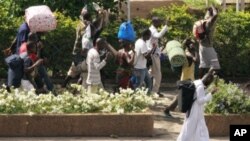Many of the people who’ve fled the violence in western Ivory Coast are now in eastern Liberia. However, humanitarian agencies are still in the early stages of helping them.
The initial influx came from the towns of Toulepleu and Blolequin and most recently from Duekoue and Guiglo.
“People have fled quite heavy combat. We’ve also recently heard of confirmed atrocities that happened in a number of these cities, as well. And people arriving here tend to report that they themselves were either the victims of atrocities or have witnessed these,” said Tariq Riebl, Oxfam’s humanitarian program manager in Liberia.
Riebl met with refugees in the Liberian border town of Zwedru, the capital of Grand Gedeh County.
“They watched people being killed in front of their eyes, family members and neighbors,” he said.
Once they cross the border
Riebl said, “Right now, we’re working with UNHCR as well as NGO partners in trying to set up transit centers that would serve as shelter places for them. These would be anywhere from 1,000 to 5,000 persons per site. But in the meantime, while these are being prepared, they have to remain in host communities, usually quite close to the border.”
Poor roads make it difficult to reach these families. “And once it starts raining they get almost inaccessible,” he says, “So the priority for us is to try and set up these sites and that has only started this week. So until then we have a lot of problems reaching people.”
The aim is to start moving people to the transit centers by the end of the week.
It’s been difficult getting an accurate number of Ivoirian refugees in Grand Gedeh County.
“This is because there are some refugees that cross back and forth. Others have been registered at least twice. However, we think, right now, we’re talking a number of about 30,000 people across the whole county of Grand Gedeh,” Riebl said.
Most of those refugees are believed to be supporters of Laurent Gbagbo, who the U.N. says lost last November’s presidential election to Alassane Ouattara. Violence began when Gbagbo refused to concede defeat and step down.
Humanitarian aid
Oxfam will provide water and sanitation facilities for the transit centers.
“We set up water treatment systems and water supply systems. We also do latrines and we do distribution of non-food items for hygiene purposes – for storage of water, soap and other hygienic items,” he said.
Oxfam is also expected help with food security among Liberian host families.
“We are worried about the food insecurity as a result of market prices going up,” he said, “and as well that Liberians have been sharing their food, which is already scarce, with Ivoirian refugees.”
Assistance would include seeds and tools to help Liberians plant more crops.




